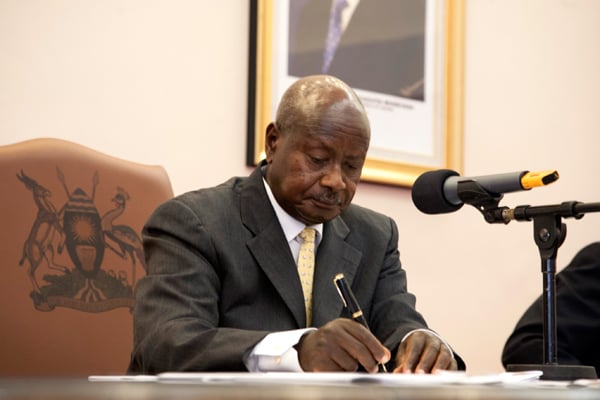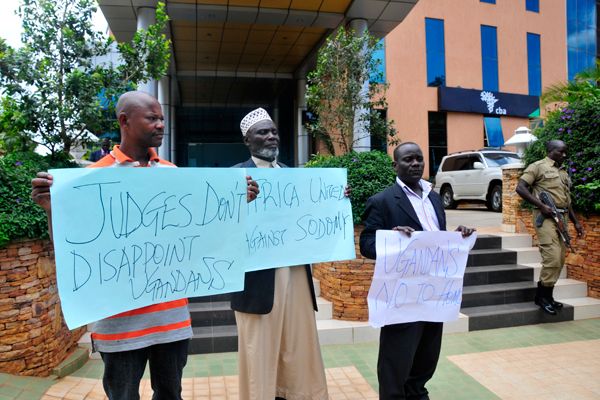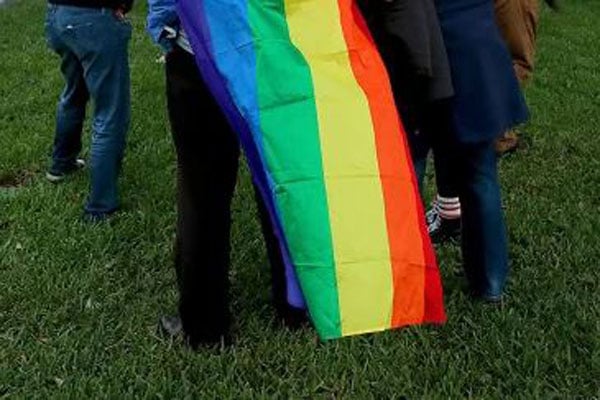Prime
Uganda puts on brave face amid threat of US sanctions over anti-gay Bill

President Museveni signs into law the anti-homosexuality Bill in 2014. PHOTO/FILE
What you need to know:
- While the US has been inexplicit and ambivalent in as far as what it intends to do to “punish” Uganda is concerned, Mr Henry Oryem Okello, the State Minister for Foreign Affairs in charge of International Cooperation, has equated the threat of economic sanctions to “school playground bully tactics”, writes Isaac Mufumba.
Strong words have been coming out of Washington and Kampala since March 21 when Parliament first passed the Anti-Homosexuality Bill, 2023.
A day after it was passed, Ms Karine Jean-Pierre, the White House Press Secretary, described the Bill as “one of the most extreme anti LGBTQ+ laws in the world” and warned of possible economic sanctions against Uganda.
“We’re certainly watching this closely and we’ll have to take a look whether or not there would be repercussions, perhaps in an economic way, if this law were to be passed and enacted,” Ms Jean-Pierre said.
Mr Henry Oryem Okello, the State Minister for Foreign Affairs in-charge of International Cooperation, has equated the threat of economic sanctions to “school playground bully tactics”.
The US has been inexplicit and ambivalent in as far as what it intends to do to “punish” Uganda is concerned. The spokesperson of the US embassy in Kampala, Mr Anthony Kujawa, recently indicated in an email to Sunday Monitor that the US’s next course of action shall depend on how Mr Museveni proceeds.
“One thing I’d like to emphasise is that the Bill has not yet been signed (or become law) so discussions about what we might do are premature,” Mr Kujawa wrote.
However, in yet the biggest indicator that Mr Museveni is going to assent to the law, Mr Oryem Okello told Sunday Monitor that whereas government recognises that the threat of sanctions is real, there will be no backing down.

Protestors outside the Constitutional Court in Kampala in 2014.
“The threat of sanctions is real, but it unjustified. The American government has abused the use of sanctions for unjustified reasons. We are ready to take the chance and then we see how to go on from there. This is not peculiar to Uganda. Ghana, Kenya, Malawi are in similar mode. It is an African thing. They have to respect our way of life as we respect their way of life,” Mr Oryem Okello says.
Previous sanctions
Should sanctions be imposed, it will not be the first time that the US will have done so over matters related to the rights of lesbian, gay, bisexual, transgender, queer or questioning communities.
In 2014, the US slapped sanctions on Uganda over anti-homosexuality law that provided jail terms of up to 14 years for those found guilty of homosexuality acts. The sentence could be increased to life imprisonment for cases involving minors, disabled offenders and HIV position persons.
Washington described the law which a defiant President Museveni assented to as one that ran “counter to universal human rights”.
A US military sponsored aviation exercise that had been planned to take place in Uganda was cancelled and funding that had been earmarked for programmes involving the Uganda Police Force and the Ministry of Health were redirected.
Targeted sanctions
It should also be remembered that sanctions of a non-economic nature have previously been imposed on government officials who the former spokesperson of the White House’s National Security Council, Ms Caitlin Hayden, said were “responsible for significant public corruption” and those involved in “serious human rights abuses”.
Since then, more than 50 Ugandan firms and individuals have been victims of those targeted sanctions. Most notable among those is the former Inspector General of Police, Gen Kale Kayihura, on who economic and travel sanctions were slapped in September 2019 for alleged involvement in corruption and human rights abuses; and the former Chief of Military Intelligence (CMI) boss, Maj Gen Abel Kandiho, on whom travel restrictions were imposed in December 2021 over human rights abuses that were alleged to have been committed under his watch.
The late Justice Wilson Musalu Musene, Justice Moses Mukiibi and city lawyers Dorah Mirembe and Patrick Ecobu were also sanctioned for alleged involvement in “significant corruption”.
On April 16, 2021, US Secretary of State Antony Blinken imposed visa restrictions on 12 Ugandan officials accused of undermining the democratic process before and during that year’s general elections.
Inconsequential?
Minister Oryem initially dismissed the targeted sanctions against Gen Kandiho.
“He is still a top CMI guy. He is protected by about 30 soldiers each time, still draws his allowances and gets respect in Uganda. He is living a quality lifestyle that many people cannot enjoy in the US. So really what is the impact of those sanctions?” he asked.
Subsequent events proved Mr Oryem wrong. Gen Kandiho was in January last year moved from CMI to the South Sudan Peace Monitoring Mission from where he was moved within a fortnight of his deployment and named Chief of Joint Staff of the Police.
Gen Kandiho, just like Gen Kayihura, have since maintained low profile existences, but are known to have engaged many people believed to have a measure of influence in the US to help them have the sanctions lifted.
The stakes
Mr John Kirby, the National Security Council Coordinator for Strategic Communications at the White House, says there will be repercussions, adding that punitive economic measures could be “devastating”.
Pepfar
Talk in circles believed to know what the thinking in the US is like have since indicated that Uganda’s slot on the list of 38 African countries eligible for tariff-free and quota-free access to the US market under the Africa Growth and Opportunity Act (AGOA) and funding towards the fight against HIV/Aids under the US President’s Emergency Plan for AIDS Relief (Pepfar) are going to be weaponised.
“The impact of our Pepfar funding, which is aiding Uganda to end HIV/Aids as a public health threat by 2030, would be severely compromised if we were not able to provide services to all Ugandan citizens requiring such support,” Mr Kujawa said.
He add, “If the AHA (Anti-Homosexuality Act) is signed into law and enacted, it would threaten the human rights of Ugandan citizens, jeopardise progress in the fight against HIV/Aids”.

An activist celebrates outside the Constitutional Court after the anti-homosexuality law was annulled in 2014. PHOTO/ FILE
There are already fear that the Americans have already tapped off funding. On April 25, the Global Aids Coordinator and Special Representative for Global Health Diplomacy, Dr John Nkengasong, announced the postponement till further notice of the final presentation of the Uganda Country Operational Plan 2023 (COP23), which had been scheduled for April 28.
The postponement came amid uncertainties that the anti-homosexuality Bill had cast around the operations of Pepfar, but Mr Kujawa, is quick to explain that it does not mean that funding has been frozen.
The postponement, he said, will allow Pepfar to time to assess the legal implications of anti-homosexuality law and how it impacts on the programmes supported by Pepfar.
“At this time, we are reviewing the possibility that the AHA, if signed, might prevent us from providing lifesaving prevention, care and treatment services equitably to all Ugandans receiving PEPFAR support,” Mr Kujawa noted.
Mr Julius Mukunda, the executive director of the Civil Society Budget Advocacy Group (CSBAG) Uganda, concurs with Kirby that Uganda would be hit hard.
“Half of the budget of the Ministry of Health is supported by Americans and Europeans. So if the passing of the Bill is going to affect them, you can imagine what is likely to happen. It goes into our buffer zone at the Bank of Uganda. It goes into service delivery, especially under the Ministry of Health. We do not have the money to counteract that. It can be very devastating economically if the threat comes to stand,” Mr Mukunda says.
Now whereas it is apparent that there will be many tears if the US touches funding towards the fight against HIV/Aids, it would appear that there will be very few tears if the US plays the AGOA card.
AGOA
AGOA has, however, been associated more with pilferage of funds than growth of the private sector or the economy.
Government guaranteed a $5m loan for garment makers, Apparel Tri-Star, from the Uganda Development Bank (UDB). The firm received an advance of $3m and a loan collateral in cash through the Bank of Uganda.
The government converted the former Coffee Marketing Board (CMB) warehouses in Bugolobi into a garment factory and dormitories, gave subsidies to facilitate training of the workers. The firm which had been created in 2003 left Uganda in October 2006 without paying off its debts.
Government also paid $300,000 to the former US Assistant Trade Representative for Africa, Ms Rosa Whitaker, to advise government on how to benefit from AGOA.
It is hard for most Ugandans to put a finger to what the country has benefitted from AGOA, but Mr Andrew Luzze, who is the points’ man on AGOA, says the benefits are quite many.
Mr Luzze says imports by US under AGOA have grown from goods worth $80,526 in 2019; to goods worth $83,330 in 2020; goods worth $92,018 in 2021 and; goods worth $173,863 in 2022, but there is a feeling that government has not done much to enable the private sector cash in on AGOA.
It should be remembered that in April 2018 then US ambassador to Uganda, Ms Deborah Malac, said Uganda had failed to take full advantage of AGOA. She blamed the scenario on lack of an “AGOA strategy”.
Contradictions?
Now whereas Oryem attempted to put on a brave face when sanctions were slapped against Gen Kandiho, the possibility of economic sanctions has him sitting uneasy.
Sanctions, he says, will be a big contradiction of the democratic principles that the US claims to espouse and support.
“The irony of all this is that the Parliament on both sides, whether it be the Opposition or the government, overwhelmingly, passed this Bill without prejudice, representing the views and the will of the people of Uganda at grassroots level. So what the Americans are fighting is the very principle of democracy that the views of the majority should be heard,” Oryem argues.
At least 340 MPs voted in favour on May 2 when Parliament passed the Anti-Homosexuality Bill 2023 for the second time. The Bill was first passed by Parliament on March 21, but it was sent back to Parliament by President Museveni with “proposals for its improvement”.
Oryem says Kampala is bracing itself for the worst.
“We are ready to take the chance and then we see how to go on from there. If they want to sanction us we know it is unjustified and this is their culture of keeping on bullying us and trying to force us into what we do not want. But when we are sanctioned then we shall see how to handle at that time,” Mr Oryem says.
How scathed would Uganda be if economic sanctions were slapped on it at a time when a cash flow squeeze has led to 40 percent Budget cuts for several ministries, departments and agencies, in the name of what Mr Ramathan Ggoobi, the Secretary to the Treasury, describes as “budget repurposing”? That we wait to see.




